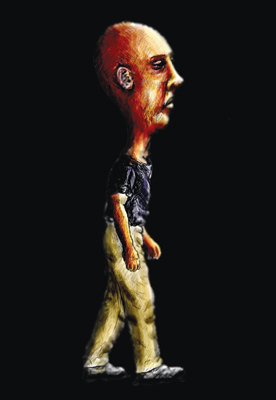All Nonfiction
- Bullying
- Books
- Academic
- Author Interviews
- Celebrity interviews
- College Articles
- College Essays
- Educator of the Year
- Heroes
- Interviews
- Memoir
- Personal Experience
- Sports
- Travel & Culture
All Opinions
- Bullying
- Current Events / Politics
- Discrimination
- Drugs / Alcohol / Smoking
- Entertainment / Celebrities
- Environment
- Love / Relationships
- Movies / Music / TV
- Pop Culture / Trends
- School / College
- Social Issues / Civics
- Spirituality / Religion
- Sports / Hobbies
All Hot Topics
- Bullying
- Community Service
- Environment
- Health
- Letters to the Editor
- Pride & Prejudice
- What Matters
- Back
Summer Guide
- Program Links
- Program Reviews
- Back
College Guide
- College Links
- College Reviews
- College Essays
- College Articles
- Back
Big Brother's [De]vices
In the novel 1984, Winston wrote, “If there is hope,... it lies in the proles” (71). Proles are the one group of citizens capable of dethroning the Party, and therefore, for the Party to ensure their perpetual rule, the teeming masses of ignorant proles must remain uninformed of the inner-workings of the Party. As ‘Emmanuel Goldstein’, who in reality is O’Brien, explains in “The Theory and Practice of Oligarchical Collectivism,” the Middle class, with the help of the Low class (the proles) under the pretense of a battle for liberty, will always overthrow the High class after a period of time and become the High class themselves. The Low class returns to being low, and the three classes exist again. The revolution cycles continually through history so that the ruling power cannot possibly remain forever (206-207). To avoid rebellion, Big Brother uses propaganda, surveillance, the invention of thoughtcrime and historical manipulation to torment the minds of the proles and party members into eternal pacificity.
In order to prevent revolution, the Party keeps proles in the dark with a false sense of freedom. The Records Department in the Ministry of Truth “suppl[ies]... the citizens of Oceania with newspapers, films, textbooks, telescreen programs, plays, novels” (44). The proles are even provided with music written by machines and pornography. All the information accessing the proles stamps out original thought, including any thoughts of disloyalty to the Party. In addition, the Ministry of Truth contorts history, creating the illusion that Big Brother is omniscient and always right. There is no evidence against the Party, because it has been rewritten in favor of the party, and without evidence there is no argument. A party textbook claims that “before the Revolution, they [the citizens] had been hideously oppressed by the capitalists,” and that the quality of life has improved greatly.
Another device used by Big Brother is the ability to concentrate the citizens’ hate. The traitor Emmanuel Goldstein, the Brotherhood, and the war (which gives the Party a viable excuse to ration food and clothing) provide the whole of Oceania with common enemies. Every last ounce of hate is squeezed out of Party members and proles during the weekly two minutes of hate and Hate Week. The Party also created the Brotherhood to trap any unsuspecting enemies of the party. The Brotherhood gives traitorous Party members hope and leads them straight into the arms of committed Inner Party members who obtain their confessions, find their hiding places, give them Emmanuel Goldstein’s book and haul them to the petrifying torture chambers in the Ministry of Love. Another device the Party uses for the capture of Party members is the telescreen, which “receive[s]... and transmitt[s]... simultaneously... [Winston] could be seen as well as heard” (2-3). The telescreens appear in bars, in the office, in the cafeteria, in apartments, and even in Winston and Julia’s prole apartment behind a picture frame (227). The telescreens detect any incriminating movements, noises or conversations. Thoughtcrime, doublethink, and crimestop are words in Newspeak that were created to describe and generate even more fear of telescreen observation. Thoughtcrime is the act of thinking against the party, doublethink is “the ability to believe that black is white...and...to know that black is white, and to forget that one has ever believed the contrary,” and crimestop is consciously stopping a thought before committing a thoughtcrime (217-218). Constant surveillance and the threat of torture in the Ministry of Love cause Party members to evolve to have the mental ability for doublethink and crimestop.
The idea of doublethink is present and in practice in today’s world. Erich Fromm, author of the Afterword of 1984, wrote: “while we speak about the free world, we actually mean all those states which are against Russia and China and not at all...states which have political freedom” (334). Many of the tools that Big Brother uses in 1984 come surprisingly close to certain aspects of the present day. Psychological torment is used by today’s police force to extract confessions from criminals. The unoriginal, machine-written music of Oceania is strikingly similar to the atonal, mechanical pop songs that bring in millions of dollars in the music industry today. Security cameras in the elevators and lobbies of apartment and office buildings are a less-intrusive variation of the crime-preventive telescreens used by the thought police in Oceania. George Orwell didn’t predict that civilization would necessarily be destroyed in favor of the Party’s policies, he just observed that society is more similar to the horrific Party society than anyone may want to believe.
Bibliography:
Orwell, George. 1984: A Novel. Centennial ed. New York: Plume, 2003. Print.

Similar Articles
JOIN THE DISCUSSION
This article has 0 comments.
